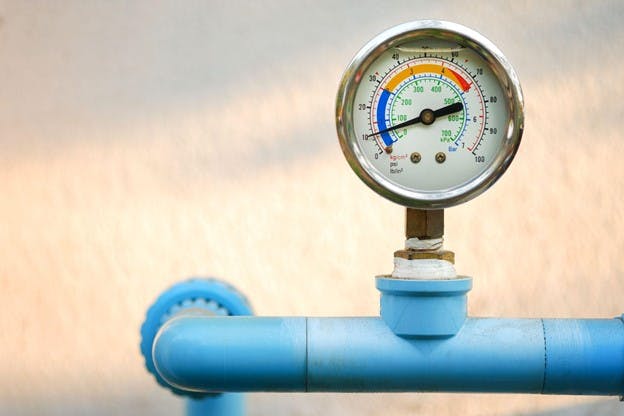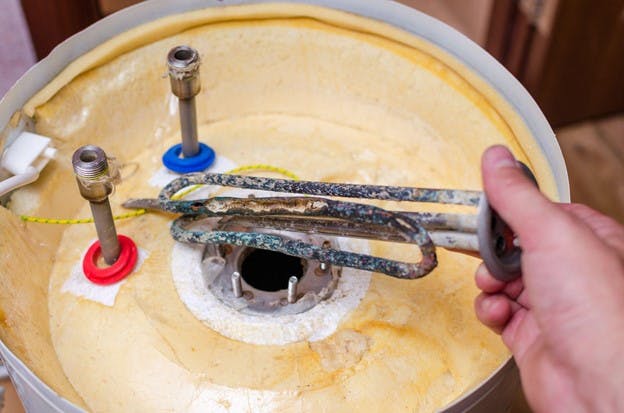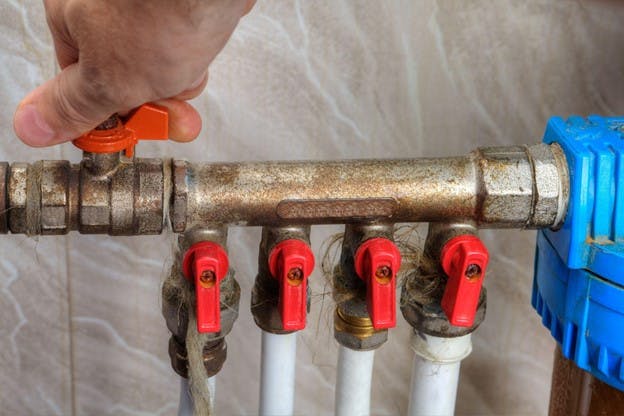🌟 New Arrival! Upgrade Your Water with Our Advanced Pitcher Filter. Shop Now
March 2023
What to Do if You Have Low Water Pressure in Your House
At some point, we’ve all taken that perfect hot shower that you never want to end. The temperature is just right, no one is nagging you, and the water pressure is perfect. On the other hand, there’s very little that is more frustrating than when there’s not enough pressure coming from your showerhead to get the conditioner out of your hair.
Low water pressure in the house is something that feels like it shouldn’t be that big of a deal until you’re faced with it. Toilets take forever to refill, rinsing your toothbrush in a trickle can be next to impossible, and good luck if you need to fill a jug or water your lawn.
But what are the causes of low water pressure and how do you know when it's a passing problem or an issue you need to do something about? In this article we’re going to make it crystal clear why low water pressure happens and how to address it.
What Does It Mean When Water Pressure Is Low?
Your home’s water pressure is measured in pounds per square inch, or PSI. The ideal pressure in your house is about 60 to 70 PSI, but 30 to 80 is the average.
When you turn on the tap and don’t get the pressure you’re expecting, at a high level it means either you don’t have enough water coming into your pipes, you have a clog somewhere in your system, or there’s a leak robbing you of your precious pressure. Finding out which of these applies to you and what’s causing it is the first step in fixing the problem.
What Are the Common Causes of Low Water Pressure in a House and How Do You Fix Them?
When determining why you have water pressure issues, looking for low-hanging fruit first is best. In other words, before you go digging up your plumbing system in the yard, make sure you’ve checked the easy boxes like calling your water company or making sure the main shutoff valve is fully open.
With that in mind, we put together a list of potential causes and solutions to your water pressure problems in the order you should check them in.
Is Your Filtration System Well-Maintained?
If you have a filtration system, check to see if it's time to change the filters. An old filter may not be able to pass as much water through as you’re used to. Make sure you replace them as often as directed.
Is There Water Running Elsewhere in Your Home?
Did someone leave a toilet running or a hose on outside? In most houses, every faucet shares the same water supply, so if water is pouring out of your hose you won’t get the same pressure anywhere else.
Is Your Hot Water Heater the Problem?
Compare hot and cold water and see if they’re similar. If your cold water pressure is normal but your hot is low, it's probably your hot water heater.
Either your water heater is struggling to keep up with your current usage or it could be corroded. If you’re dealing with corrosion, you may consider a water softener to save your pipes and appliances.
Is Trapped Air in Your Pipes Causing Low Water Pressure?
Sometimes air can get trapped in your pipes and cause all sorts of problems. If you’ve ever heard knocking in your pipes and walls, this might be the issue. If you think you have air in your pipes you should flush your system.
If you have a multi-story home, start on your lowest floor by turning on the hot and cold water just a little bit in each faucet. Keep them on and move to your next floor up and do the same. Keep going until every faucet in your home is running. Let them all run for about two minutes and then turn them off, starting at the top floor and working your way back down.
Wait about 15 minutes and check your water pressure again.
Did it fix it? If not, let’s move on.
Are Your Water Pressure Problems Caused by a Dirty or Corroded Plumbing Fixture?
If it’s not the air in your pipes or your hot water heater, you’ll want to know whether the drop in pressure is a problem everywhere in your house or just one faucet or appliance.
If it's just your kitchen faucet for instance, it could be sediment buildup or corrosion in only that plumbing fixture. If this happens, the easiest thing to do is to check the aerator, which is the small screen that aerates the water coming out of your faucet. It has many tiny holes that can get clogged by mineral deposits, sediment, or rust. This is especially true if you have hard water.
Removing the aerator and cleaning it might be the quick, DIY solution to your problem. You should know though, if your aerator is corroded and clogged, there's a good chance it's also happening inside that fixture. Luckily most fixtures aren’t that expensive and are fairly easy to replace. This is good news because if cleaning the aerator doesn’t fix it, replacing the fixture is your next best move.
Just be sure to use that water shutoff valve before you remove it.
Is Your Water Shutoff Valve Fully Open?
If your pressure problem is going on in more than one or two places, it's likely a problem further up the chain. Let’s check off the easy ones first.
If you’re a homeowner, you probably know that you have a shutoff valve between the municipal water main and your pipes, and you also likely have a water meter, which has another shutoff attached to it.
If either of these become partially turned off, it will cut your water supply down and could leave you with frustratingly low water pressure in the house. Your first order of business should be to check the water main shutoff valve since this is usually the easiest one to access. It might be in your yard or it could be in your house. Once you find it, make sure it’s fully in the on position.
If your water main shutoff valve isn’t the problem, you’ll want to consider the water meter valve. Usually though, these aren’t the problem since they’re often underground and hard to get to. Unless yours is easier to access, you can feel pretty confident it's not your water meter valve unless you’ve recently had work done on the house.
If everything checks out and you still have a problem, it’s time to move on to the next step.
Is Your Water Pressure Regulator Lying to You?
The pressure regulator, or pressure reducing valve, regulates pressure from the main water supply line to your house’s plumbing. Its job is to keep your plumbing safe, but it can malfunction and leave you with low water pressure in your house.
Not everyone has a water pressure regulator installed in their house so if you don’t have one, you can skip this step. If you do have one though, go take a water pressure gauge to your hose spigot and see what it says. If your pressure regulator and your pressure gauge don’t match up, your regulator is likely the problem.
The good news is replacing it is often possible to do on your own if you’re comfortable tinkering. Otherwise, it should be short work for a good plumbing service.
Are Your Neighbors Having Water Pressure Problems?
If your flow of water just isn’t as strong as you want it to be and you’ve checked the easy things in your home, the next step is to ask around and see if it's a shared problem.
Go knock on a few doors or send some texts to your neighbors. Find out if they’re experiencing similar water pressure issues. If so, it may be a problem with the water main or your water supplier that you might just need to wait out.
Does Your Water Company Know Already?
Regardless of whether your neighbors are having a problem or not, the next step is going to be to call your water supplier and find out if there is a known issue. Since you’ve talked to your neighbors already, you can let them know if multiple houses are having the problem or if it's just you. Make sure to follow any instructions they might give you.
The main thing you’re trying to figure out here is if there’s a known issue in your area that will end soon or if it's time to maybe call a licensed plumber. There’s another reason to call the water company though. If they’re having a problem with their water pressure, this could mean the water coming out of your tap is contaminated.
A boil water notice happens when your water supplier determines your water may not be safe to drink or cook with. One of the most common reasons for a boil water notice is when pressure in the main water line drops. The pressure inside the main is usually enough to keep contaminants from outside the supply pipe from seeping in. But if the pressure drops in the water main, your water quality can also drop and there could be a boil water notice issued.
Many water suppliers rely on media and word of mouth to alert the public about boil water notices, so there’s a chance you could miss it. Calling the water company can give you peace of mind that the water coming from your home’s plumbing is safe to drink.
If you’ve gotten this far and still don’t have any answers, it’s time to consider that you may have more serious plumbing issues.
Is It Time to Call a Licensed Plumber?
If nothing above helped, it's probably time to call in a licensed plumber and see if you have any blockages or leaks in your pipes.
Water pipes don't last forever and that’s especially true of some of the older steel pipes that can corrode and leave less space for your water to pass through. A good plumber has several methods for checking your pipes for corrosion without having to dig them up.
If it's not a blockage, it could also be a leak. This could be more serious as the water could be damaging your home or foundation. If you have a leak in your plumbing, you want to get it taken care of as soon as you can so it doesn’t do real damage to your home. Leaks usually start small, so if it's bad enough to affect your water pressure, it’s most likely not in its beginning stages and you should take it seriously.
Keeping Your Water Flowing Strong
Low water pressure in a house can have many reasons for happening and some of them are more serious than others. Often it happens because hard water minerals, heavy metals, and other sediment cause build up and corrosion inside your pipes and appliances.
If you’re having trouble with low water pressure, you should consider HomeWater’s Whole House 4-Stage Water Filter with a salt-free water softener. This low-maintenance system won’t slow down your water flow and it will leave you with nothing but the best-tasting, high-quality, clean water. Since it's a whole-house filter, it stops sediment and minerals before they reach your home’s plumbing so you can keep your pipes flowing strong.




